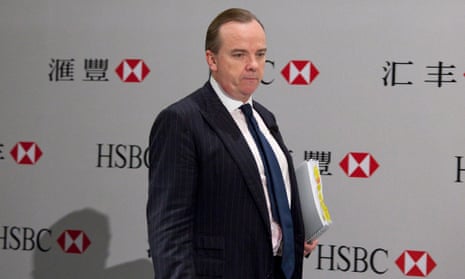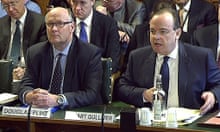Stuart Gulliver, the HSBC chief executive who has vowed to reform the crisis-hit bank, sheltered millions of pounds in a Swiss account through a Panamanian company and remains tax domiciled in Hong Kong.
Leaked files show that the Derby-born Gulliver, who is due to present HSBC’s annual report on Monday in the wake of the international controversy over its Geneva-based private bank, was also one of its clients, holding about £5m in a Swiss account.
The bank executive was listed as the beneficial owner of an account in the name of Worcester Equities Inc, an anonymous company registered in Panama, containing a balance in 2007 of $7.6m. It was through this entity that Gulliver’s HSBC bonuses were paid until 2003. He also held a second account in the name of Worcester Foundation, which had been closed before 2007.
Although now based in the UK, where HSBC has its headquarters, Gulliver is domiciled in Hong Kong for legal and tax purposes.
The banking details have emerged as the 55-year-old Oxford University graduate, who became chief executive in January 2011, is due to face questions from reporters and investors for the first time since the Guardian and other media outlets published the leaked HSBC files, which revealed misconduct at the bank’s Swiss subsidiary.
The documents, covering 2005-07, detailed how the private bank was complicit in tax evasion and aggressive tax avoidance, doled out bricks of cash in mixed currencies to clients, and provided banking services to criminals, drug smugglers, and friends and families of dictators.
Gulliver has already personally signed a “sincere apology” which appeared in three newspapers last Sunday, saying “the standards to which we operate today were not universally in place in our Swiss operations 8 years ago”.
The bank is expected to announce on Monday full-year profits for 2014 in excess of £13bn – and Gulliver’s total compensation package has been predicted to be around £7.5m, although it was reported over the weekend that he may surrender some of his remuneration because the bank agreed to pay fines to settle unrelated allegations of foreign exchange rigging last year.
In response to queries from the Guardian about his personal account as revealed in the leaked files, a representative for Gulliver said he had made use of HSBC Suisse to hold his bonus payments prior to 2003, when he moved from Hong Kong to London.
Lawyers for Gulliver said that Hong Kong tax had been paid on this income – and explained that he “followed this procedure because he wanted his taxed bonus earnings to remain private from his then colleagues in Hong Kong, which they would not have done if he had kept them in an HSBC Hong Kong account”.
The Guardian asked Gulliver why he used a Panamanian company to hold the funds, given Swiss accounts already offer secrecy. His lawyers declined to answer.
Gulliver’s legal representatives added that his Swiss accounts have “for a number of years” been voluntarily declared to UK tax authorities. They declined to specify the exact date they were first declared.
Gulliver is also among those current and former clients of HSBC Suisse to take advantage of non-dom status. Gulliver is a registered non-dom based on his long residence in Hong Kong – now a special administrative region of China – which he considers to be his home, despite his UK-based position.
A representative for Gulliver said: “Having lived there since the 1980s, our client has become a permanent Hong Kong resident with right of abode, as has his wife who is an Australian national. Hong Kong continues to be their home albeit that our client now works primarily in the UK. As a matter of law, our client is domiciled in Hong Kong.”
Non-dom status can confer several tax advantages on those who claim the status compared with those domiciled in the UK. These include advantages in how inheritance tax is applied, but can also exempt worldwide income earned from outside the UK from incurring UK taxes – a system known as the remittance basis.
Gulliver’s lawyers confirmed he was “entitled to claim the benefit of the remittance basis”, but did not say whether or not he did so. If Gulliver were on the remittance basis, he would not need to pay tax on investment income held outside the UK – which would include holdings in Swiss bank accounts.
A representative for Gulliver said that he had paid all relevant income taxes: “Full UK tax has been paid on the entirety of his worldwide earnings less a credit for tax paid additionally in Hong Kong (where he is also tax resident) on that part of the same earnings doubly taxed.”
John Christensen, director of the Tax Justice Network, which has campaigned for abolition of non-dom tax benefits in the UK, said the non-dom quirk was particularly attractive for anybody who had accumulated assets such as homes and bonuses offshore, because any gains on offshore assets would be sheltered from UK tax.
“For my part I think it illustrates the absurdity of the rule, which should have been abolished many years ago. It serves no useful purpose and is hugely discriminatory against ordinary UK taxpayers,” he said.
Separately, Gulliver did not become employed by HSBC’s main holding company when he took over as chief executive of the bank in 2011. Documents seen by the Guardian at the time showed that Gulliver took the job of chief executive officer as a secondment from the Dutch-headquartered HSBC Asia Holdings, rather than take a straightforward appointment to the UK parent company.
A spokesman for HSBC said around 350 of its staff were employed through the Netherlands. “About 350 of the bank’s most internationally-mobile employees are employed by HSBC BV,” he said. “This enables them to be employed/seconded to any part of the global group without the need to change contracted employer.”
Representatives for Gulliver declined to explain for what purpose he was employed through the Netherlands subsidiary.
Gulliver has repeatedly emphasised to the public and to lawmakers that the culture of the bank, as well as its safeguards, has changed – both in the wake of the HSBC Files, and previous scandals including Libor rigging, and involvement with Mexican money laundering.
Since the publication of the HSBC files, the bank has been keen to stress that it has downsized the Swiss business, reducing the number of clients by 66%, to around 10,000. However, the total value of assets in those accounts – $68bn (£44bn) – has fallen by only 42%.









